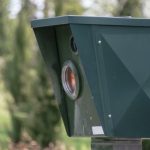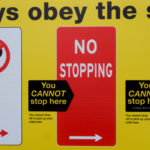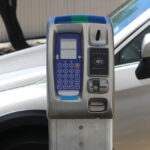Is Leaving Your Vehicle’s Window Open an Offence in New South Wales?

Leaving your vehicle unattended with the window down is a little-known offence in New South Wales, but it’s an offence all the same and comes with a fine.
One Sydney couple found this out the hard way, when police issued them with a fine last month for leaving their truck’s window open while the vehicle was parked immediately outside their home.
Police say the offence is designed to ensure that drivers are proactive in avoiding vehicle theft, but many believe it’s over the top and primarily about revenue raising.
But the couple believe it’s unfair to receive the $112 fine, especially when the husband was out the front of their house gardening, and going to and from his vehicle for tools.
“The car was in view of my husband. We didn’t go out and leave it unattended, it was literally in front of him,” Richelle Amey from Caringbah stated, calling the fine “ridiculous” and saying she was “disgusted” about receiving it.
“$112 fine for not shutting car windows, the car was parked on the street at my home and husband was working in the garden in eye view of the car”.
“I never knew this was a crime, so shut your windows”, she warned.
What does the law say?
Regulation 213 of the NSW Road Rules is titled ‘Making a motor vehicle secure’ and states as follows:
‘(1) This rule applies to the driver of a motor vehicle who stops and leaves the vehicle on a road, except so far as the driver is exempt from this rule by an exemption order under rule 213-1 or an exemption under rule 313A (2).
(2) Before leaving the vehicle, the driver must apply the parking brake effectively or, if weather conditions (for example, snow) would prevent the effective operation of the parking brake, effectively restrain the motor vehicle’s movement in another way.
(3) If the driver will be over 3 metres from the closest part of the vehicle, the driver must switch off the engine before leaving the vehicle.
(4) If the driver will be over 3 metres from the closest part of the vehicle, and:
(a) there is no-one left in the vehicle, or
(b) there is only a child or children under 16 years old left in the vehicle,
the driver must remove the ignition key before leaving the vehicle
(5) If the driver will be over 3 metres from the closest part of the vehicle and there is no-one left in the vehicle, the driver must:
(a) if the windows of the vehicle can be secured–secure the windows immediately before leaving the vehicle, and
(b) if the doors of the vehicle can be locked–lock the doors immediately after leaving the vehicle.
(6) For the purposes of subrule (5), a window is secure even if it is open by up to 2 centimetres.’
The maximum penalty for each offence is 20 penalty units, which currently amounts to $2,200 and the penalty notice amount is currently $112.
Demerit points do not apply for any of the offences.
The following are exempted from the offences:
(a) such vehicles are used for the purpose of delivering or collecting goods (including money) in circumstances that require the drivers of those vehicles to enter and leave those vehicles at frequent intervals, and
(b) the engines of such vehicles have to be kept running in order to operate equipment used in connection with the use of those vehicles for that purpose.
‘… the driver of a vehicle engaged in the collection of waste or garbage’.
A ‘road’ is broadly defined by section 12(1) of the Road Rules 2013 as:
‘an area that is open to or used by the public and is developed for, or has as one of its main uses, the driving or riding of motor vehicles.’
The definition does not include the shoulder of a road, or a road related area which under section 213(1) of the Road Rules is:
(a) an area that divides a road,
(b) a footpath or nature strip adjacent to a road,
(c) an area that is not a road and that is open to the public and designated for use by cyclists or animals,
(d) an area that is not a road and that is open to or used by the public for driving, riding or parking vehicles.
Summary
So in a nutshell, unless you are an exempted driver such as a delivery, collection or garbage truck driver, it is a traffic offence for you not to do any of the following acts in an area which has driving as one of its main uses:
- Apply the parking brake before you leave the vehicle,
- Switch off the engine if you are more than three metres away from the vehicle,
- Remove the key if you are more than three metres away from the vehicle and there is no one other than a child or children under 16 inside, or
- Ensure the windows are no more than two centimetres ajar and the doors are locked.
You can contest the penalty notice if you believe you are not guilty of the offence, but you should be aware that a court can impose a fine of up to $2,200 if you do so and are found guilty.
Unfair ‘revenue raising’ when people are doing it tough
Police have also been criticised for not simply issuing a warning to the vehicle owners, particularly during this time, when the Covid-19 pandemic has affected many people financially – either they’ve lost jobs or had their incomes reduced, and are struggling to afford necessities, let alone significant traffic fines.
And, as the mental health experts keep pointing out, financial stress is one of the main causes of anxiety and depression which, when severe enough, can lead to lives spiraling out of control.
But police say they’re just doing their job, no matter how heartless it might seem.
Fines are big business for the NSW government. It collected $485 million in traffic and other fines in 2018-19. This is on top of the $221 million revenue raised through parking fines. This amounts to about 30% of the state’s income.
In the financial year 2019-2020, The New South Wales the Government expected to collect $3.5 billion in total revenue from traffic and other fines, regulatory fees, licences and miscellaneous revenues.
This was prior to COVID-19 public health regulations, and the fines imposed for breaching these. The NSW Government has not released official information about revenue collected from COVID-19 fines, although some reports suggest it has collected about half a million dollars in fines.
Earlier this year as a result of the pandemic, the NSW State Government did introduce a new financial hardship policy that enables eligible financially-strapped residents and social security recipients to have their fines halved or moved to a payment plan. The scheme came into effect on July 1, and applies to fines collected by Revenue NSW, including traffic, speeding and parking fines.
Issued with a Fine under the Road Rules or Road Transport Act?
If you have been issued with a fine for a traffic-related offence, call Sydney Criminal Lawyers anytime on (02) 9261 8881 to arrange a conference with one of our experienced traffic lawyers who will advise you about the law, your options including requesting a revenue and challenging the infringement in court and the likely outcome.
Alternatively, our state have mechanisms through which you are able to request a review without the assistance of a lawyer.
Going to court for a traffic offence?
If you are going to court for a traffic offence, call or email Sydney Criminal Lawyers anytime to arrange a free first consultation with an experienced, specialist traffic lawyer who will accurately advise you of your options, the best way forward, and fight for the optimal outcome in your specific situation.








